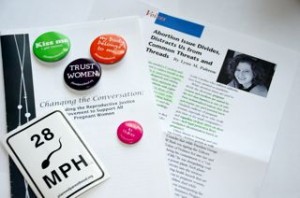 The other night I was invited by a friend to attend a lecture in Rochester by Lynn Paltrow, lawyer and advocate for reproductive freedom, and executive director and founder of National Advocates for Pregnant Women (NAPW). Planned Parenthood sponsored the event.
The other night I was invited by a friend to attend a lecture in Rochester by Lynn Paltrow, lawyer and advocate for reproductive freedom, and executive director and founder of National Advocates for Pregnant Women (NAPW). Planned Parenthood sponsored the event.
Honestly, I was more interested in attending for cocktails, friendship and a night out than to support an issue that really didn’t register on my radar. I was pleasantly surprised because after listening to Paltrow, she made me think, question and explore other possibilities to a seemingly black-and-white matter: how anti-abortion laws are being used against pregnant women.
Paltrow is an eloquent speaker not only because she’s an expert on women’s reproductive rights, but also because she challenges old views and presents a very interesting and different perspective. She shared stories and examples of mothers who found themselves on the other side of the proverbial reproductive coin.
A mother of 7 who opposes abortion, was almost forced to have a C-section that she did not want because according to her state’s law “fetuses are legal persons with rights,” and therefore trumps what mommy wants. While the hospital got a court order for custody of the fetus before, during and after delivery and the right to perform a C-section, the woman fled. She delivered her baby naturally at another hospital.
Another mom-to-be had cancer and was forced to undergo a c-section she and her family didn’t want. Unfortunately, she and her baby died within days of the surgery.
In Paltrow’s testimony to a South Dakota task force to study abortion, she presented this: “Does a woman lose her right to informed medical decision when she becomes pregnant? Could the state mandate that all women deliver by c-section because of perceived benefits to the unborn child? Could the state outlaw vaginal births after c-sections?”
Paltrow continued to present lots of examples and thought provoking questions to make her point: abortion is not the key issue, but the anti-abortion laws are being used to control women involuntarily, especially if these women are non-white or poor.
I noticed lots of nodding heads in the room full of mostly women. (Interesting fact: 61% of women having abortions are already mothers.)
Did your mom smoke when she was pregnant? If you were born in the 50s or 60s the answer is probably yes. In some states, today, that might be legal grounds for arrest for child endangerment or child welfare intervention.
What then do you do about a pregnant mom who is so drunk that she passes out while watching her child? Does she have the right to put a mind-altering drug in her body because it’s her body, her choice, yet at the same time endanger her living and unborn child? Do you think she intended to hurt her children?
Every time I come up with an answer, I have another question. Why doesn’t government ban everything bad for human beings? Why can’t human beings exercise good judgment? What is bad? What is good judgment?
I don’t presume to have all the answers, nor does Paltrow, as convincing as she may be. Abortion, abortion rights, abortion laws, reproductive justice, pro-life, pro-choice are all gray areas with lots of what ifs?
After her presentation, Ms. Paltrow walked over to my table – spanning three generations of women – and sat down to join our discussion. Together we listened and shared. One thing I learned is that the dialogue needs to be more inclusive. Perhaps we all need to walk a mile in another woman’s shoes before we judge her.
What do you think?
Connect with me on Facebook or Twitter. Leave a comment on my website or send me an email.


Kris,
Thank you for sharing some of the key points made at this presentation- I wish I had been there. Your thoughtful comments and questions illustrate your interest in true dialogue rather than diatribe. There is a shortage of factual discussion, considerate listening and willingness to learn on all sides of many societal issues. With mid-term elections around the corner, each of us needs to wade throught the shallow sound bites that send people to their respective corners on this and many other particularly divisive topics. Not an easy task, but I am sure posts like yours will encourage many of us to search for more facts, and think about what some of the unintended, and potentially freedom killing consequences are when we take the “it’s black or white” approach to an argument.
Thanks again for taking the time to write about this!
Gwen